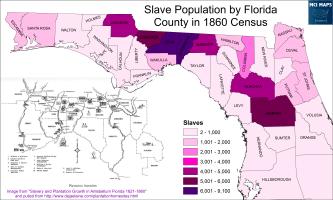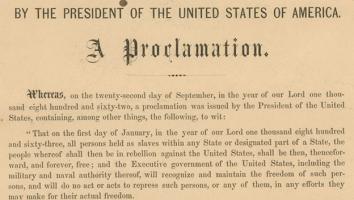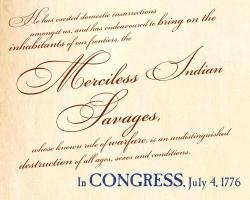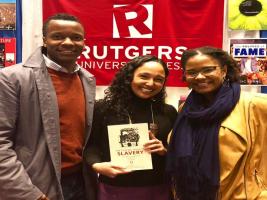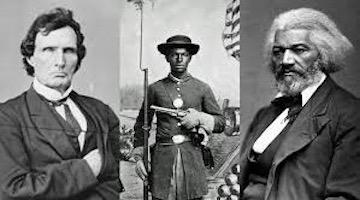In this series, we ask acclaimed authors to answer five questions about their book. This week’s featured author is Jesse Olsavsky. Olsavsky is Assistant Professor of History at Duke Kunshan University in China.. His book is The Most Absolute Abolition: Runaways, Vigilance Committees, and the Rise of Revolutionary Abolitionism, 1835–1861.
Roberto Sirvent: How can your book help BAR readers understand the current political and social climate?
Jesse Olsavsky: The Most Absolute Abolition tells the little-known story of how vigilance committees revolutionized the antislavery movement. From the 1830s to the outbreak of the American Civil War, northern abolitionists formed vigilance committees to assist runaways in their struggles to free themselves from an ever-growing slave empire. The committees defended black neighborhoods from police and slave catchers. They forcefully freed fugitives from prisons, and helped plan John Brown’s Raid. They also served as the urban wing of the Underground Railroad, assisting as many as 10,000 fugitives to escape, while building an elaborate network of underground allies from the South to the North, from the Caribbean to Canada to the British Isles. In so doing, the committees attracted a diverse array of radicals of all genders, races, and classes. Moreover, through vigilance committees, thousands of runaways came into dialogue with northern activists and became the teachers of Abolitionism. This fugitive pedagogy of the vigilance committees not only radicalized abolitionist sensibilities and tactics, but also inspired novel forms of feminism, prison abolition, reparationism, and utopian speculation.
Throughout the 20th century anticolonial, antiracist, labor and feminist activists from across the Atlantic world looked to the histories of Abolitionism and the Underground Railroad as a source of inspiration, as a way of seeing the present through the past, and as an unfinished politics to be carried forward. The most absolute of abolitionists, particularly those active in vigilance committees, thought through and fought against the fundamental contradictions, or problems, of modernity, whether it be white supremacy (national and planetary), patriarchy, imperialism, prisons, or even capitalism itself. Many of today’s activists are part of that tradition of abolitionist critical thought and praxis, and can learn much by being “radical,” that is, going straight to the historical roots of that tradition.
What do you hope activists and community organizers will take away from reading your book?
The revolutionary and political prisoner Russel Maroon Shoatz (1943-2021) once wrote from prison: “The Underground Railroad stands as the most militant, egalitarian movement this country has ever seen. . . . There were vigilance committees, UR conductors, and stockholders. These brave and committed individuals were the technicians of the movement, while its heart and soul were always the runaways themselves.” My book takes that statement seriously; for attempts to denounce or downplay the militancy of the past makes political possibility in the present seem narrower than it might actually be.
All too often, academic histories of the Underground Railroad merely narrate daring stories of how fugitives were moved from one “station” to another. The fugitives’ underground is rarely treated as a radical space of learning, imagination, and revolutionary speculation, a movement of ideas as much as of people. The Most Absolute Abolition tells a different story, of a “most militant, egalitarian movement,” in which tens of thousands of fugitives taught northern vigilance committee activists, most of whom were black, female, or working class. Together, runaways and vigilance activists exchanged ideas about the political economy of slavery and about antislavery tactics; about religion and culture; about patriarchy and empire. In addition to organizing substantial parts of the maritime and landed networks of the Underground Railroad, they also published three dozen slave narratives, wrote novels, histories, and poems, sang songs, and plotted (unsuccessful) slave insurrections.
One of my most useful discoveries is that vigilance activists were sometimes prison abolitionists. Fugitives called enslavement the “prison house” and some fugitives and abolitionists used that language to critique all forms of confinement, including prisons. They broke runaways out of jail, fought police, and critiqued penitentiary discipline. One member of the Boston Vigilance Committee even wrote an elaborate plan for the full abolition of prisons and police!
We know readers will learn a lot from your book, but what do you hope readers will un-learn? In other words, is there a particular ideology you’re hoping to dismantle?
There is a lot to unlearn. I tend to deal with the nitty gritty facts of peoples’ histories, that is, the important facts, or those that have gone little-noticed or under-emphasized by previous historians. But, I suppose one ideological position I try to critique is the tendency to see abolitionism as wholly encompassed by and living off of the western liberal political tradition. Certainly, vectors of the Abolitionist Tradition were liberal in content (an extraordinarily democratic form of liberalism), or had made tragic compromises with the liberal order originally based upon exclusion. In many cases abolitionism rescued liberalism from some of its worst injustices and exclusions; in other cases liberalism diluted Abolitionist radicalism. Nevertheless, there was also much in the Abolitionist Tradition far in excess of our current politics, deeply subversive, anticipatory of ways of life yet to be realized. Abolitionists, in their best moments, critiqued penitentiaries, settler colonialism, the American war machine, the Constitution, and a few even viewed the American Revolution as a counterrevolution to preserve and expand slavery. Vigilance committee activists often discussed these ideas—in addition to disobeying the constitutionally sanctioned fugitive slave laws—and so I make sure to highlight much of this. As organizations devoted substantially to a politics of “underground” direct action, vigilance committees attracted the most militant, most absolute, of abolitionists. Though not all vigilance committee activists were extreme radicals, the committees nevertheless became breeding grounds for many of abolitionism’s most subversive ideas and practices.
Which intellectuals and/or intellectual movements most inspire your work?
The Ghanaian anticolonial activist Kwame Nkrumah, in his profound book Neo-Colonialism once wrote: “colonial emancipation became the dominating phenomenon of the mid-twentieth century, just as the abolition of slavery was of the corresponding period of the nineteenth, with just as crucial consequences in national and international politics and economics.” We live in the wake of the two great transnational efforts to overturn planetary white supremacy—abolition and decolonization. Those two movements were certainly limited and flawed and sometimes beaten back, or at least crippled, by imperialism, but they posed many of the questions we are still trying to answer, and began many of the transformations we are still trying to finish. This is why so many movements and activists, in the US and the world, still call for “abolition” and “decolonization.”
I have learned a lot from the intellectual traditions arising from these two movements. Among the intellectuals who have thoroughly influenced The Most Absolute Abolition are such well-known writers as Angela Davis (Women, Race, and Class), C.L.R. James (The Black Jacobins), Eric Williams (Capitalism and Slavery), and W.E.B. Du Bois (Black Reconstruction and John Brown). The American communist Philip Foner’s monumental 5-volume collection The Life and Writings of Frederick Douglass is another must read.
Which two books published in the last five years would you recommend to BAR readers? How do you envision engaging these titles in your future work?
Manisha Sinha’s The Slaves’ Cause and Richard Blackett’s The Captives’ Quest for Freedom are two recent books that have influenced me a great deal. However, in my current and future work, I am moving out of the nineteenth century to explore the little-known revolutionary trajectories of abolitionist thought in the twentieth century. I have started to work on a second book, tentatively titled ‘“In the Tradition’: The Abolitionist Tradition and Human Emancipation.” Throughout the twentieth century, numerous emancipatory movements in numerous parts of the world—from Pan-Africanism to Black Power, from Anarchism to Communism to various anti-colonial movements—studied, wrote about, and re-invoked the nineteenth-century abolitionist movement during their own struggles for self-determination. There was, in short, a long history of activists consciously seeing themselves as heirs to radical abolitionism, or as part of what anti-colonial activist Paul Robeson called “the abolitionist tradition.” The project will outline the contours of that tradition.
Roberto Sirvent is editor of the Black Agenda Report Book Forum.

